Commentary: The case for going vegan on Alien Day
Published in Op Eds
Have you ever pondered the iconic image of a UFO beaming up a cow? I often wonder whether the aliens aboard that craft are actually rescuing the cow from humans. As many of us consider the possibility of life beyond this planet on Alien Day (April 26), let’s also remember the intelligent life all around us—and resolve to make Earth a kinder, healthier place by leaving our fellow earthlings off our plates.
If extraterrestrials exist, let’s hope they don’t treat humans the way we treat other species. Since childhood, many of us have been taught to show kindness to some animals and to disregard others. Some of us were lucky enough to share our hearts and homes with a beloved dog or cat, but at dinner time, our well-meaning caregivers fed us foods like fried chicken, pepperoni pizza, meatloaf or spaghetti and meatballs.
Animals who are used for food feel love, joy, pain and fear, just as dogs and cats do. But they’re tormented and killed in ways that make the terror depicted in an alien abduction flick seem mild by comparison. To maximize output while minimizing costs, factory farms cram animals onto filthy feedlots or into cages so small that they’re prevented from standing up or turning around. Once they reach a certain size—or when their bodies have become exhausted by unnaturally continuous milk or egg production—they’re forced onto trucks and transported to slaughterhouses over long distances and through all weather conditions, deprived of food and water. If they survive the hellish journey, workers slash their throats open—often while they’re still conscious.
Loving some animals while eating others is a hallmark of speciesism—the misguided notion that all other species are inferior to our own. But there’s no need to perpetuate this illogical and unethical fallacy. Grocery stores and restaurants offer a galaxy of delicious and healthy vegan foods and drinks. These foods fuel our bodies without harming anyone. According to the Academy of Nutrition and Dietetics (ADA), vegan eating is not just nutritionally adequate but also beneficial for preventing and treating certain diseases. The ADA reports that when compared with meat-eaters, vegans have a reduced risk of death from ischemic heart disease, lower levels of blood cholesterol and lower blood pressure, decreased rates of hypertension and type 2 diabetes, lower body mass indexes and lower overall cancer rates.
Plus, going vegan opens up a world of tasty, healthy meals, from hearty lentil chili to flavorful chickpea curries and refreshing quinoa bowls. It’s easy to upgrade old favorites—for example, making meatballs with Beyond Beef Crumbles or topping pizza with vegan cheese.
We know the planet is in peril. Experts confirm that due to human-caused climate change, there has been an uptick in natural disasters. We can see and feel the effects of the climate catastrophe, which animal agriculture is making even worse: Cows and other animals used for food generate and release copious amounts of methane gas through digestion. Just one cow emits an estimated 154 to 264 pounds of methane annually, and methane has more than 28 times the impact of carbon dioxide on the atmosphere.
There is no planet “B,” so eating vegan is the best thing we can do to ensure a livable future. A study by scientists from Stanford University and the University of California-Berkeley suggests that if humans stop raising other animals for food over the next 15 years—and more people switch to vegan eating—it could help curb the increase in harmful greenhouse gases in the atmosphere for 30 years, allowing humanity additional time to end its dependence on fossil fuels.
Animal agriculture also gobbles up vast swaths of land. Even though an estimated 44.2 million Americans experience food insecurity, most farmland—about 80%—is used to raise animals for food and grow crops to feed them. It would be far more efficient—and humane—to use this land to grow plants for people to eat directly.
If extraterrestrials exist, what would they think of humankind’s violent, unsustainable food system? Contemplating a third-party analysis of human society sheds light on how speciesism hurts all animals, including humans—and it’s imperative that we abolish it. Thanks to the universe of satisfying vegan foods available in grocery stores and restaurants everywhere, saving the planet and those who call it home isn’t a moonshot.
____
Rebecca Libauskas is a climate research specialist with the PETA Foundation, 501 Front St., Norfolk, VA 23510; www.PETA.org.
___
©2024 Tribune Content Agency, LLC.







Comments